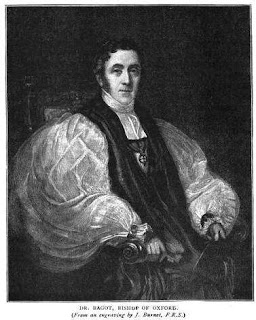"All the benefits which flow from that wondrous union": Bishop Bagot's 1842 Visitation Charge and Eucharistic piety
Continuing the new series of weekly posts on visitation charges of Old High bishops in the immediate aftermath of the Tract XC controversy, we again turn to the 1842 Visitation Charge of Richard Bagot, Bishop of Oxford. Here Bagot offers an example of the warm sacramental piety of the Old High tradition, grounded in the Articles of Religion and Catechism. A warm, sacramental piety, therefore, did not require a reliance on the doctrines and practices of other communions. Also significant, of course, is the fact that this summary of sacramental teaching was quite unremarkable and uncontroversial in terms in the pre-1833 Anglican eucharistic consensus.
Remind them of the awful warning of our Lord himself, "Except ye eat the flesh of the Son of Man, and drink his blood, ye have no life in you". And join to that warning, as He in mercy joined, his wondrous promise, "Whoso eateth my flesh, and drinketh my blood, hath eternal life, and I will raise him up at the last day". Tell them, that whether there be, or be not, other ways of receiving that precious food "the living bread which came down from Heaven", "the Bread of Life" this blessed Sacrament is the way, the only way, specified by our Lord himself. Tell them, whatever be the clamour with which such teaching is assailed, whatever be the names 'Papists', or whatever else by which you may be called tell them the truth, as declared by Christ, and preached by St. Paul, and as you have yourselves solemnly engaged to preach: tell them, without "reserve", that "the bread and wine which the Lord hath commanded to be received" is the outward sign of "the body and blood of Christ, which" (we know not how, for God hath not seen fit to show us how) "are verily and indeed taken and received by the faithful in the Lord's Supper". That "the bread, there broken, is the communion to us of the body; the cup of blessing, which is there blessed, is the communion of the blood, of Christ": that "we thereby are made one with Christ, and Christ with us," and so are blessed with all the benefits which flow from that wondrous union. Make them know, experimentally [i.e. experientially] know, that such is the heavenly blessing of that Sacrament; as our Article teacheth, it is "a Sacrament of our Redemption by Christ s death", to all who receive it in penitence, in faith, in thankfulness, in charity.




Comments
Post a Comment